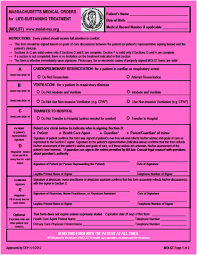MA Allows Verbal Consent on MOLST
 PLEASE NOTE this policy was only a temporary emergency measure during the pandemic. It is no longer a valid policy. EMS Protocols have been updated as regard to MOLST verbal and written consent. Please see the current EMS Protocols, MOLST is at 7.3.
PLEASE NOTE this policy was only a temporary emergency measure during the pandemic. It is no longer a valid policy. EMS Protocols have been updated as regard to MOLST verbal and written consent. Please see the current EMS Protocols, MOLST is at 7.3.
We are excited to announce that for the duration of the COVID-19 State of Emergency, the state has suspended the standard requirement of a written signature on a MOLST form and allows for verbal consent, to be reliably honored by all EMS personnel and licensed practitioners in hospitals, long-term care facilities and across all health care settings.
This offers an important remedy for clinicians where face-to-face MOLST conversations are not possible. Clinicians can now initiate proactive planning conversations via telephone or virtual means with high risk patients, their Health Care Agents and Guardians, to discuss goals of care and complete or revise a MOLST form with witnessed verbal consent.
The Emergency Update to the EMS Protocol 7.3 cites the following requirements for documenting verbal consent:
Where it’s not possible impossible to follow usual MOLST standards requiring written signatures, clinicians are to document on the MOLST form:
- a) the patients, patient’s health care agent’s or guardian’s verbal consent;
- b) who witnessed this verbal consent (in accordance with the standards of the health care facility in which the patient is located); and in addition,
- c) document in the patient’s medical record the details of how verbal consent was obtained.
Upon reviewing such a MOLST form for a patient they encounter, EMS personnel are to accept a form that contains a) and b) in accordance with this procedure. As long as the witness portion is documented, EMS can accept it as meeting the standards of the health care facility.
Please read the Full Emergency Update to Protocols 7.3 here
All health care facilities can rely on their standard policies to suggest procedures for their staff in alignment with the new protocols.
Special thanks to the collaborative efforts of Lachlan Forrow, MD and our committed MA MOLST Advisory Subcommittee and MA Guardianship-MOLST Advisory Committee in sending a letter to the state to request a change in protocols.
We are so thankful to Governor Baker and the incredible state leadership for their thoughtful policies to keep us all healthy and safe. We appreciate their prompt attention to this critical issue. It will greatly help our clinicians as they initiate conversations with high risk patients, their Health Care Agents and Guardians, to deliver the best possible care that honors an individual’s values and choices.
The protocols are posted at COVID-19 Guidance & Directives
- In the Table of Contents, click on Emergency Responders & Law Enforcement
- Scroll to Emergency Statewide Treatment Protocols:
